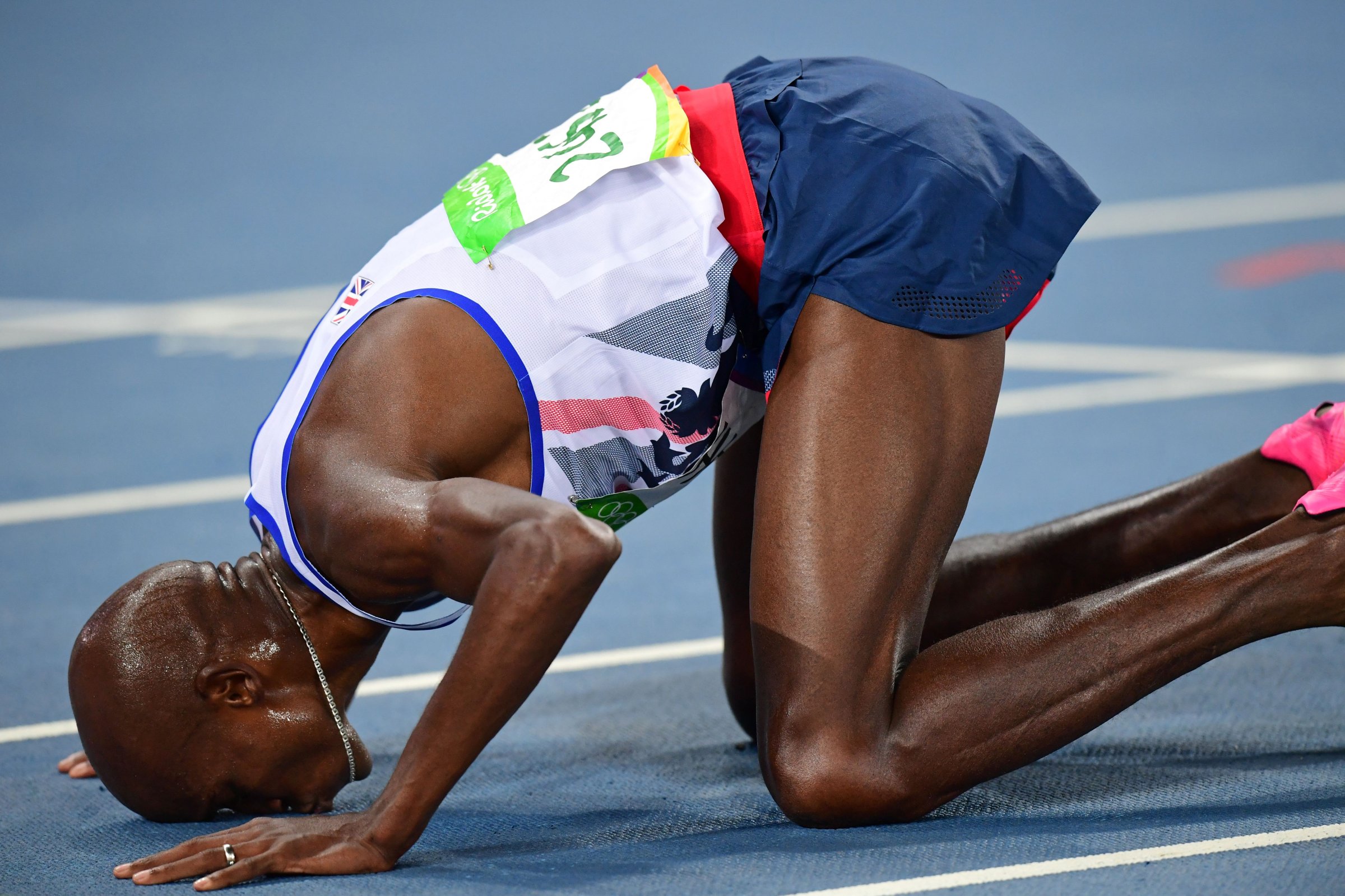
Before the Opening Ceremony, mentions of Islam in relation to the 2016 Rio Olympics were often linked to terrorism and security. But as the Games come to an end, fears of a terror attack have been eclipsed by the athletic exploits of Muslim athletes, and prevailing stereotypes have been outpaced by the images of Muslim excellence.
Mo Farah, Sarah Ahmed and Ibtihaj Muhammad offer examples of Muslim athletes who flourished on the Olympics’ stage amid suspicion, racism and Islamophobia in Rio.
The Power of Prayer
On Aug. 13, Somali British long distance runner Mo Farah sought to claim back-to-back gold medals in the 10,000-meter run. In the middle of the race, the favorite locked his legs with another runner and fell on the track. He bounced right back up, strategically wove his way past the pack and claimed gold.
After he crossed the finish line, Farah fell on the track again—this time to pray. He bowed his head before a stadium of adoring spectators. That performance was just as dramatic as racing past Kenya’s Paul Kipngetich Tanui to win this third gold medal.
Farah’s prayer can help counter the damaging stereotypes of Muslims held by many around the world. For Farah, and scores of Muslim athletes, faith is not incidental, but central to their excellence in sport. “I normally pray before a race,” Farah said. “I read du’aa [Islamic prayers or invocations] think about how hard I’ve worked and just go for it.”
The Weight of Gendered Stereotypes
A young woman in a head scarf can often conjure up images of frailty and disempowerment. But Egyptian weightlifter Sara Ahmed is anything but. She can out-lift most women in the world and has the kind of physical power few possess.
Donning all black with a red headscarf, the colors of her nation, the diminutive Ahmed lifted a combined weight of 255kg (562lbs) to claim the bronze medal in the 69kg weight class. The feat, given her nationality and ethnicity, was unprecedented. Ahmed became an instant icon in her native Egypt, becoming the first female medalist in the nation’s 104-year history in Olympics’ competition and the first Arab woman to win an Olympic medal in weightlifting.
As she bowed her head to receive her medal, Ahmed represented world-class power, strength and Muslim womanhood, disrupting tropes that have enabled headscarf bans in France and trite oppression narratives in America and elsewhere.
Fencing Off Islamophobia and Racism
Ibtihaj Muhammad was a star in the Muslim American community long before she stepped onto the global scene. But her story was about far more than being “the first U.S. Olympian to wear a hijab during competition.” She championed a cause long-ignored by non-Muslims and Muslims alike: the distinct experience of African American Muslims and the distinct perils often created by intersecting racism and Islamophobia.
Read more: A New Face for Team USA
In response to Donald Trump’s proposed ban Muslim immigrants to the U.S., Muhammad responded: “I’m African American. I don’t have another home to go to. My family was born here. I was born here. I’ve grown up in [New] Jersey. All my family’s from Jersey. It’s like, well, where do we go?”
Read more: Ibtihaj Muhammad Makes History in Rio
She claimed bronze. But her story, and the ignored narratives her Olympic excellence made possible, is golden.
More Must-Reads From TIME
- The 100 Most Influential People of 2024
- Coco Gauff Is Playing for Herself Now
- Scenes From Pro-Palestinian Encampments Across U.S. Universities
- 6 Compliments That Land Every Time
- If You're Dating Right Now , You're Brave: Column
- The AI That Could Heal a Divided Internet
- Fallout Is a Brilliant Model for the Future of Video Game Adaptations
- Want Weekly Recs on What to Watch, Read, and More? Sign Up for Worth Your Time
Contact us at letters@time.com